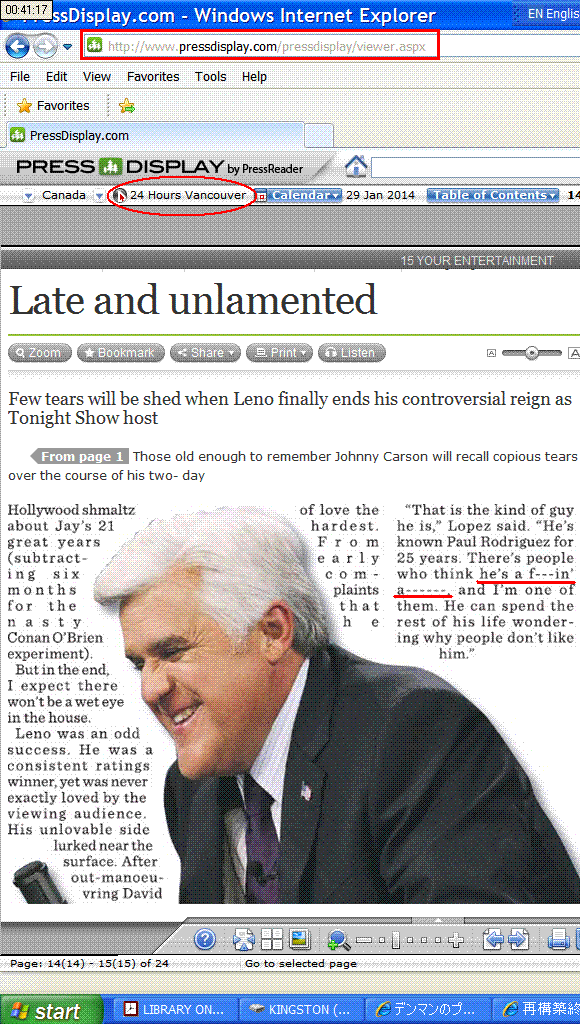Troublesome Slang (PART 2 OF 3)

Yes, yes, yes! ... Diane, you're absolutely right! How come I haven't got that flash-bulb moment? Breaking it down, it means "this black person" ... nothing else! I haven't come up with a way of breaking it down.

Well ... everybody has a blind spot, huh?
Diane, you're such a smart babe! I've become a little bit smarter now!

But, Kato, that slang IS a yucky thing to say about black people. You shouldn't use it.
I know... I know ...
By the way, Kato, how come you pick this subject again?
Good question! Actually I've written an article about some slang the other day.
<iframe width="500" height="350" src="//www.youtube.com/embed/BM9T1oO_umM" frameborder="0" allowfullscreen></iframe>

(24h40128.gif)
■"Jay Leno Story"

What is this?

This is a "24 HOURS" community newspaper article about Jay Leno, who ends his controversial reign as Tonight Show host. Have you read the article?
No, I haven't. But it sounds interesting.
It is. Apparently, people love Johnny Carson more than Jay Leno.
But Jay Leno seems to be a likable fellow, doesn't he?
Yeah, he looks like it on the surface, but some people hate him.
So, Kato, you've written an article about why some people hate Jat Leo so mcuh, haven't you?
Oh, no. I'm not interested in Jay Leno 'cause I've never viewed Tonight Show. I don't really care about him.
Then what did you write about?
In the article is the following passage:
“That is the kind of guy he is,” Lopez said. “He's known Paul Rodriguez for 25 years.
There's people who think he's a f---ing a------, and I'm one of them.
He can spend the rest of his life wondering why people don't like him.”
「アイツはそういう男なんだよ」、とロペツは言った。
「アイツはポール・ロドリゲスと25年間付き合いがある。
アイツは、箸にも棒にも引っかからない、どうしようもないロクデナシ野郎だと思っている人間がたくさんいるんだよ。
俺だって、そう思っている一人さァ。
どうして自分が人から嫌われているのか、アイツは死んでも、解らないままじゃないかなァ!?」
(デンマン訳)
『夏目漱石と南方熊楠』より
(2014年2月7日)

So, you've written an article for the Japanese audience, haven't you?

Yes, mainly for the people who understand Japanese.
Obviously, you're interested in the red-colored portion, aren't you?
Yes, I am. You see, Diane, if you live in Canada for 6 months, you can hear the above phrase so many times. So, naturally, you'll have no difficulty in finding it out and understanding its meaning.
I see.
But these days, you seldom hear disn**ga. That's the reason I couldn't solve the above slang puzzle. Besides, I had no idea that disn**ga consisted of two words.
So, this is the thing you want to tell in this article, isn't it?
Oh, no. There is another thing to tell you. Diane, tell me, what is slang?
Well ... Slang is some word to degrade a thing or a person with.
Yes, yes, yes, ... you're right to a certain extent. Actually, few linguists have endeavoured to clearly define what constitutes slang. Attempting to remedy this, Bethany K. Dumas and Jonathan Lighter argue that an expression should be considered "true slang" if it meets at least two of the following criteria:
■ It lowers, if temporarily, "the dignity of formal or serious speech or writing"; in other words, it is likely to be considered in those contexts a "glaring misuse of register."
■ Its use implies that the user is familiar with whatever is referred to, or with a group of people who are familiar with it and use the term.
■ "It's a taboo term in ordinary discourse with people of a higher social status or greater responsibility."
■ It replaces "a well-known conventional synonym". This is done primarily to avoid discomfort caused by the conventional synonym or discomfort or annoyance caused by having to elaborate further.

... quite interesting, isn't it?

Yes, it is.

(laugh16.gif)
(To be followed)